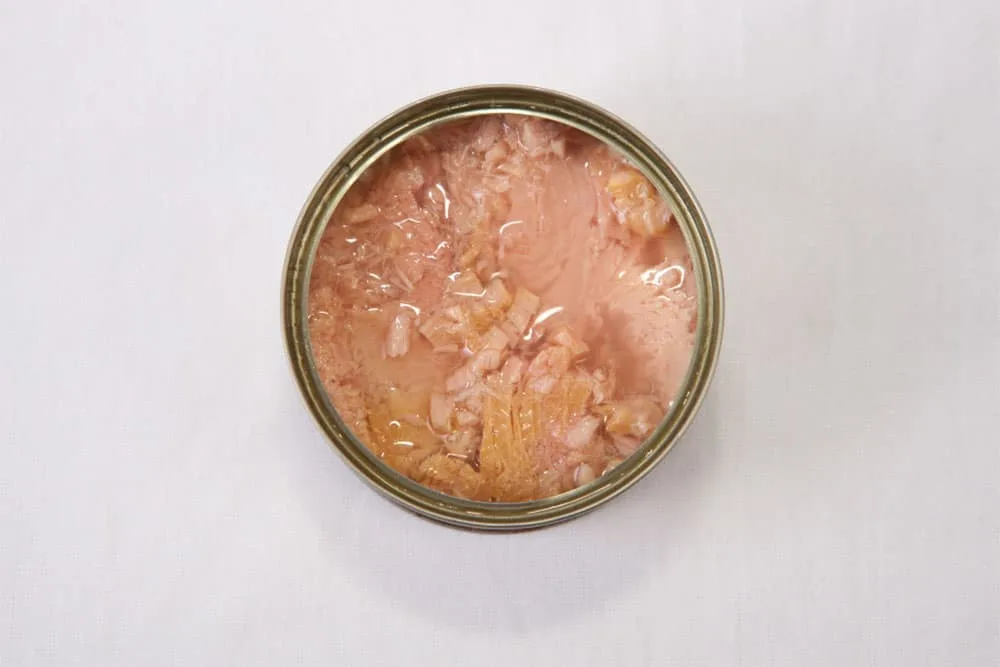An In-Depth Look At Feeding Canned Tuna To Dogs
A lot of dog food companies use tuna in their products, but there has been much debate over whether tuna is safe for dogs.
Naturally, you want to treat your dog the best you can, so you’ll want to know, is tuna safe for dogs?
The answer isn’t as straightforward as it seems! In this article, we’ll break down whether dogs can eat tuna or not, whether canned or raw tuna makes a difference, and if tuna is safe for puppies.

Is Tuna Safe For Dogs To Eat?
For the most part, your dog will be fine if they have a little tuna. However, this should only be in small amounts.
As the sea has become contaminated with mercury, this metal can end up inside little fish in the ocean.
Bigger fish, like tuna, eat those smaller fish. Then the mercury ends up inside the tuna that we buy from the store.
As a result, the tuna you give your dog can contain low concentrations of mercury. Consuming too much mercury is harmful for you and your dog, so some choose to stay away from tuna completely.
However, the mercury in tuna is in small quantities. As long as your dog only has tuna occasionally, and only in small amounts, they should be fine.
Can Tuna Be Good For Dogs?
Tuna does have some health benefits, which can be good for your dog in small amounts. Tuna is a great source of protein.
If your dog has a sensitive stomach or doesn’t like poultry, tuna can provide the protein it needs.
Tuna also contains important vitamins for your dog’s health, like vitamin D, vitamin B12, and riboflavin. It’s also packed with omega-3 fatty acids that can help improve cholesterol.
The antioxidants, vitamins, and minerals in tuna can provide many health benefits for your dog. So yes, tuna can be good for your dog.
However, as stated before, only give tuna in small amounts so your dog doesn’t consume too much mercury.

Can Dogs Eat Canned Tuna?
Dogs can eat canned tuna – but you have to choose the right can. Tuna cans can come packed in water, brine, or oil.
You’ll want to stay away from brine cans, as they can contain high amounts of salt. It’s easy to consume too much salt, which can cause sodium poisoning in dogs.
Salt can still remain in the tuna after draining the can, so it’s best to stay away from brine cans completely.
Canned tuna in sunflower oil is safer than brine cans, as long as they’re fully drained. Compared to other oils, sunflower oil is lower in saturated fats, and in small amounts, can be good for your dog’s fur and skin.
Despite these benefits, too much oil can make your dog gain weight, and can also cause inflammation.
The best option for your dog is tuna in spring water. These cans are safer for your dog, as they shouldn’t contain any oils or salt.
Remember that tuna lives in saltwater, so it will be higher in sodium compared to freshwater fish.
There are low sodium cans available though, just check the label to compare options. Some tuna cans can contain spices, like onion, garlic, and chili.
These aren’t good for your dog, so make sure that your can is free from any additives.
Can Dogs Eat Raw Tuna?
Raw tuna might be tasty in sushi, but can be one of the worst things for your dog.
All kinds of raw fish can contain parasites, bacteria, and other nasties that can be bad for your dog’s health. It can also contain bones that could cause choking or stomach upsets.

If you want to give your dog a tuna steak, make sure that it’s cooked all the way through beforehand. Stay away from higher mercury varieties, like bluefin tuna.
Albacore or skipjack tuna will have less mercury, so will be safer for your pup.
If you’re bringing raw tuna home, be sure to keep it out of your dog’s reach. Even the best-behaved ones could grab that tasty looking fillet from right under your nose!
How Much Tuna Can A Dog Have?
Tuna fish has many health benefits, but there is a real risk of mercury and sodium poisoning when eaten regularly.
Your dog should only have tuna as a rare treat. Make sure that when you give your dog tuna, that the portion size is small.
Never give them a whole can, and don’t give your pup tuna more than a couple of times a month. A small spoon on their regular food is enough for them.
If your dog hasn’t had tuna before, you’ll need to see how they react to the addition in their diet.
Introduce a small spoonful, then watch them carefully to see if there are any side effects. Any health issues or allergies are likely to occur in the first 24 hours.
After a day, you can decide whether to continue giving tuna to your dog or not.
Is Tuna Safe For Puppies?
Puppies should stay away from tuna. In small amounts, tuna can be fine for adult dogs, but as your puppy is smaller, this amount can be too much for their tiny stomachs.
This means that the risk of mercury poisoning is higher compared to fully developed dogs.
During those first few months, your pup is growing and getting used to the world around them. It takes up to a year for a puppy’s digestive system to develop properly.
Giving them food that they aren’t ready for can cause stomach upsets, obesity, and inflammation.
After examining your puppy, your veterinarian should recommend a special diet full of the necessary nutrients that they need.
The Bottom Line
Yes, dogs can have tuna fish – but only in small amounts! Tuna contains low concentrations of mercury, which is poisonous if eaten regularly.
If you want to give your dog tuna, make sure that it is cooked, only give a spoonful every few weeks, and stick to low sodium spring water cans.
Tuna is full of antioxidants, but your dog can get all the nutrients it needs from safer dog food options.




















